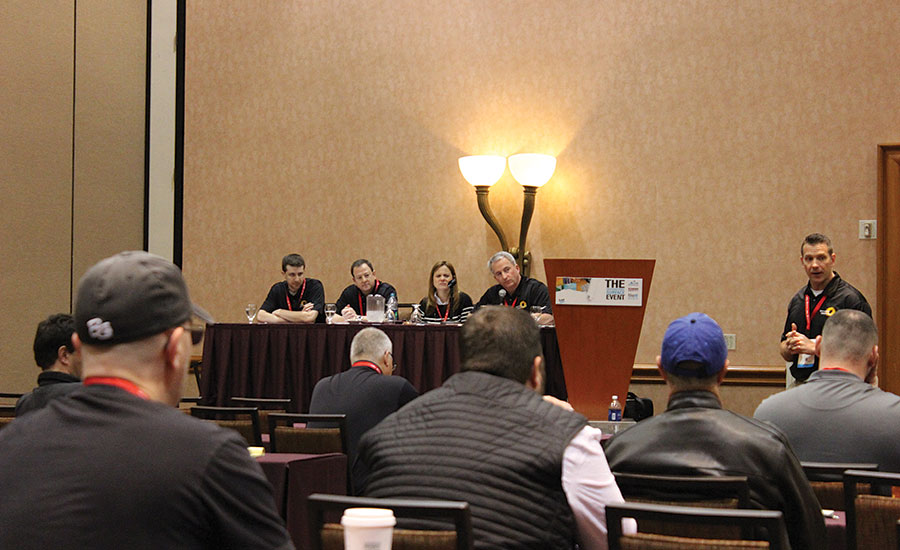An exchange of ideas, experiences and advice once again took place during the Fabricator Forum, which is held annually during The International Surface Event at the Mandalay Bay Convention Center in Las Vegas, NV. The 2016 exhibition was held from January 20 to 22, with the education program beginning on January 19, and it drew record numbers.
Entitled “Fabricator Forum: Real Talk, Real Solutions,” the session was designed to be an open platform to discuss issues challenging countertop fabricators today. The conversation this year heavily revolved around finding competent employees, how to train them and benchmarking to track progress and results.
The Forum was moderated by Eric Tryon, CEO of Premier Surfaces in Alpharetta, GA, and the 2015 winner of Stone World’s Fabricator of the Year award. It also included an experienced panel of stone industry professionals. They were:
• Kimberly Homs, owner of Great In Counters in Smithfield, RI
• Jon Kaplan, CEO of Stoneworks Ltd. in Bedford Heights, OH
• Brian Burns, Founding Partner - Finance, Purchasing & Facilities, Cutting Edge Countertops, Inc., Perrysburg, OH, and Brighton, MI
• Jon Ryan, Inspiration Design Center, Burnsville, MN
“One thing I love about this industry is there is a lot of knowledge,” Tryon said when first addressing the room. “Reaching out and finding those resources is pretty big.” Tryon stressed the value of the industry associations such as the Marble Institute of America (MIA) and Stone Fabricators Alliance (SFA). He explained they are great resources for information.
Finding reliable workers
Among the first topics discussed during the Fabricator Forum was employment. “How do you find employees?” asked Tryon. Burns said he usually finds his workers in a network in the construction industry and Tryon said he turns to recommendations from existing employees. “[A total of] 57% of our hires last year came from inside referrals,” he said. “We pay our employee $500 for a referral. You need a team around you that is confident.”
Burns said he has hired through networks he has made in the construction industry. Additionally, his company has made alliances with local construction colleges and technical schools. Students can do internships at the shop.
Making sure the person is a right fit for the job is critical. “We do a phone interview, and we do an aptitude/personality assessment on top of their skill set,” said Burns. “Then we bring them in for an interview.”
Tryon told the audience it is important to make the person who you are hiring aware of the job requirements. “The worst thing you could do is set someone up for failure,” he said. “Be clear. Letting them know what it is going to be like is really important.”
He also stressed the importance of taking the time to research potential employees. “We have a huge liability in what we do,” said Tryon. “You don’t want criminals on your staff. A background check is one of the best things to do.
“This labor thing isn’t going away,” he went on to say. “If you want to separate yourself from the rest, you should take some time with it.”
Homs pointed out a shop’s culture also has to be considered. “The smaller you are, the more important the culture is because you are more like a family,” she said. Echoing her words, Tryon said, “We hire on values, not on what they know. We can teach them what they need to know. Culture fit is important.”
Homs also said she believes cross training employees is a must. “If you have one person doing one thing, and if they get sick or want to go on vacation, you can’t hold up production,” she explained.
Training programs
Another topic discussed during the Forum was training programs. “The more training we give our employees, the more they feel connected and part ownership,” said Burns. Kaplan mentioned that he holds weekly salesforce training. “We try not to overload the training,” he said. “We keep it consistent.”
For those that do not have a formal training program in place, Homs suggested checking out what information the MIA has to offer on the subject. “It’s a good place to start,” she said.
Tryon told the audience that if an employee isn’t doing their job, he believes it boils down to two reasons. “It’s either, one: ‘I don’t know how,’ or two: ‘I don’t care,” he said.
Tryon explained that his company stopped hiring install help. “We started an apprentice program,” he said. “An apprentice becomes a lead installer within six months. And then soon they can become a templator. It completely changed the way we hire — our mind set. It’s a major commitment, but worth it.”
Those in the audience thought this was a good idea. Buddy Ontra of Ontra Stone Concepts in Bridgeport, CT, and a representative of the Northeast Zone on the MIA Board of Directors, pointed out an installer is the first impression for a company’s customers. It is important they represent the business in a professional and courtesy manner.
Benchmarking
Benchmarking is another important measure employers should take for a successful business. “How do you know how many incidents a person has had?” Tryon asked the audience. “How do you know if a department is successful? How do you know where to focus your time and energy?”
“It takes a lot of discipline, but you can’t change anything if you don’t track,” said Burns. “We go way over the top. We track everything. It really helps when evaluating employees.”
Burns also brought up that while shops tend to track square foot per labor hour, it is key to also look at the financial transactions. “Does square feet pay your bills?” he asked. “Dollars do. Start managing how much dollars go through a day.”




